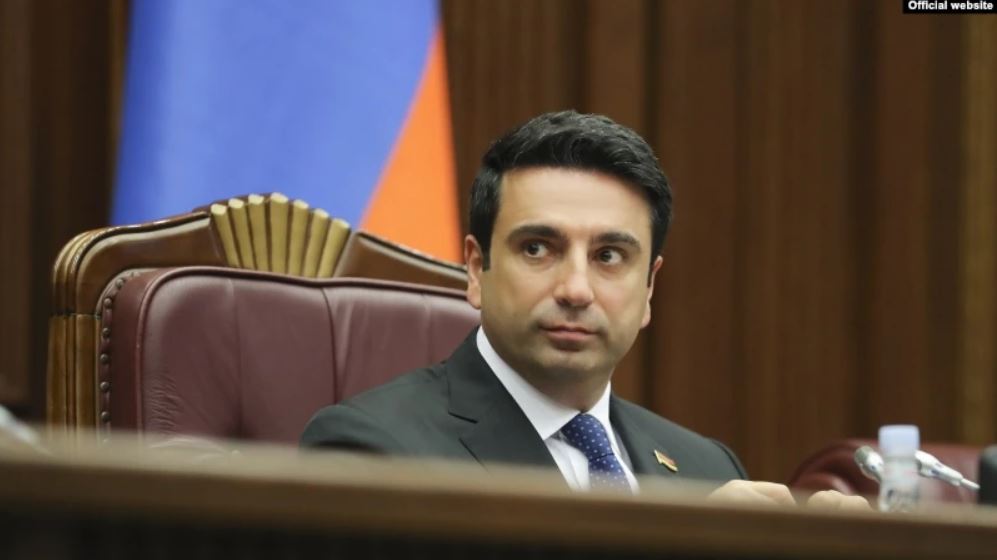Armenian Parliament Speaker Alen Simonyan sparked outrage on Tuesday after publicly justifying Azerbaijan’s military takeover of Nagorno-Karabakh (Artsakh), stating that Baku had a legitimate right to retake the region by force.
In an interview with RFE/RL’s Armenian Service over the weekend, Simonyan asserted that Azerbaijan’s 2020 military offensive in Karabakh was backed by international law, including United Nations resolutions. “When the second Karabakh war started, we were very upset because the world did not respond to that war the way we wanted,” Simonyan said. “The reason [for that response] was also the lack of legitimacy, the lack of legitimacy on our side.”
He further justified Azerbaijan’s actions by distinguishing between its assault on Karabakh and any potential aggression against Armenia itself. “Attacking Karabakh and occupying territories from Armenia are different things from the legal standpoint,” Simonyan explained. “Azerbaijan carried out an operation in Karabakh behind which it had at least three or four UN Security Council resolutions.”
These comments, in which Simonyan openly validates Azerbaijan’s legal grounds for reclaiming Artsakh, drew strong rebukes from opposition figures. Gegham Manukian, a lawmaker from the opposition Hayastan alliance, condemned the remarks during a parliamentary session, questioning who advised Simonyan to make what he called a “very stupid point.” Manukian emphasized that the UN resolutions in question, adopted in the early 1990s, were focused on halting hostilities and did not grant Azerbaijan any legal basis to attack and occupy Artsakh.
“The UN resolutions did not give Azerbaijan any semi-legitimate, even insignificant, legal basis for attacking and occupying Artsakh,” said Manukian.
Simonyan, however, stood firm in his position, maintaining that Azerbaijan’s actions were justified. “We are talking about a legitimate right, and there is nothing new in what I said,” he responded. “The fact is that that territory in question was and is internationally recognized as part of Azerbaijan.”
Simonyan’s remarks align with Armenian Prime Minister Nikol Pashinyan’s controversial recognition of Azerbaijani sovereignty over Karabakh in May 2023. This recognition came nearly three years after Pashinyan held a rally in Stepanakert where he famously declared, “Artsakh is Armenia. Period.” Opposition groups claim that Pashinyan’s concession paved the way for Azerbaijan’s September 2023 military offensive, which restored full Azerbaijani control over Artsakh and led to the mass exodus of its Armenian population to Armenia.
Pashinyan has been repeatedly blamed for Armenia’s defeat in the 2020 Nagorno-Karabakh war, and his acknowledgment of Azerbaijani sovereignty over Karabakh has only intensified these criticisms. Many political opponents argue that this diplomatic capitulation facilitated Azerbaijan’s continued aggression. Pashinyan, in response, has claimed that the 2020 war could have been averted, but that the outcome would have been the same without the loss of life. This statement, made in April 2022, provoked anger among the families of the 3,825 Armenian soldiers killed during the six-week conflict, who accused the prime minister of deliberately sacrificing lives and called for his prosecution.
Simonyan himself has been a controversial figure since 2021 when he made disparaging remarks about Armenian soldiers captured during the 2020 war. Some of their relatives protested against him, accusing the speaker of disrespecting the memory of those who had suffered and died in the conflict.
Despite mounting criticism, both Pashinyan and Simonyan continue to stand by their positions, framing their recognition of Azerbaijani control over Karabakh as a necessary, albeit painful, acknowledgment of international realities.




